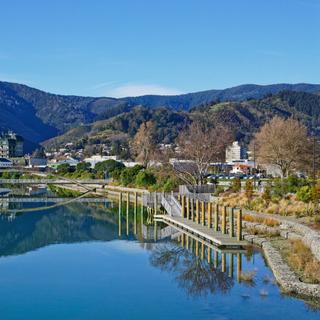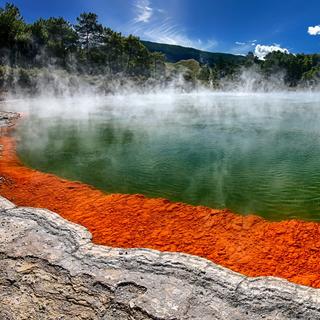Invercargill weather and climate in 2026
Day
19 °C
Night
10 °C
Sea
15 °C
Precipitation
79 mm
in month
Rainy days
12 days
in month
Daylight
14 hours
average
Sunshine
6 hours
average
Humidity
82 %
Weather charts for Invercargill
Find more destinations like this
Closest destinations for Invercargill
Closest cities for Invercargill
Weather overview for Invercargill
Weather overview
Invercargill (New Zealand) in general has a mild climate. Temperatures during the day are in the range from 10 °C (49 °F) in July to 19 °C (67 °F) in January. Temperatures during the night go from 1 °C (34 °F) in July to 10 °C (50 °F) in January. The least rainy month in Invercargill is February with its 12 days of rain, the rainiest month is May, when it rains 17 days.
January weather
The tourist season slowly starts in Invercargill. The day temperature reaches its maximum, with its value being 19 °C (67 °F), and the maximum of the night temperature is observable too, with its value being 10 °C (50 °F). The number of rainy days descent's start could be observed, its value is 14 days, and the rainfall amount starts to descent too, the value of this measure is 104 mm (4.09 in). The number of sun hours (without clouds) starts to descent in January.
February weather
The tourist season is close to its peak in Invercargill. The number of rainy days is on its minimum, with its value of 12 days, while the rainfall amount continues to descent, the value of this measure is 79 mm (3.11 in).
March weather
The number of rainy days starts to rise, with its value of 13 days in Invercargill, and the beginning of the rise of the rainfall amount could be noticed too, the value of this measure is 101 mm (3.98 in). The beginning of the descent of the day temperature could be noticed, with its value of 18 °C (64 °F), and the night temperature descent's start could be observed as well in this month. The number of sun hours (without clouds) descent's start could be observed, with its value being 4 hours.
April weather
The day temperature descents similarly to the previous month, its value is 15 °C (60 °F) in Invercargill, and the night temperature descents similarly to the previous month as well. The rainfall amount starts to descent, with its value being 84 mm (3.29 in), while the number of rainy days continues to rise, with its value of 14 days. The number of sun hours (without clouds) continues to descent, its value is 3 hours.
May weather
The maximum of the number of rainy days can be noticed, with its value of 17 days in Invercargill, and the maximum of the rainfall amount can be noticed too, its value is 109 mm (4.30 in). The descent of the day temperature can be observed, and the night temperature continues to descent too. The descent of the number of sun hours (without clouds) can be observed, the value of this measure is 3 hours.
June weather
The day temperature descents similarly to the previous month, with its value being 10 °C (50 °F) in Invercargill, and the night temperature descents similarly to the previous month too, with its value of 2 °C (36 °F). The number of rainy days descent's start could be observed, with its value of 16 days, and the rainfall amount starts to descent too in this month. The minimum of the number of sun hours (without clouds) can be noticed, with its value being 3 hours. The day length is on its minimum in June.
July weather
The minimum of the day temperature is observable, with its value being 10 °C (49 °F) in Invercargill, and the night temperature is on its minimum too in this month. The rainfall amount descents similarly to the previous month, with its value of 71 mm (2.81 in), and the number of rainy days continues to descent too, its value is 15 days. The wind speed is on its minimum. The humidity is on its maximum, with its value being 88 %.
August weather
The day temperature rise's start could be observed, with its value being 11 °C (52 °F) in Invercargill, and the night temperature rise's start could be observed too, the value of this measure is 2 °C (36 °F). The number of rainy days continues to descent, the value of this measure is 14 days, while the rainfall amount reaches its minimum, its value is 67 mm (2.63 in). The number of sun hours (without clouds) starts to rise, with its value being 4 hours.
September weather
The rainfall amount starts to rise in this month in Invercargill. The night temperature continues to rise, its value is 4 °C (39 °F), and the rise of the day temperature can be observed as well, with its value of 13 °C (56 °F). The number of sun hours (without clouds) continues to rise, with its value being 4 hours.
October weather
The day temperature rises similarly to the previous month, with its value of 15 °C (58 °F) in Invercargill, and the night temperature rises similarly to the previous month too, with its value being 6 °C (42 °F). The beginning of the rise of the number of rainy days could be noticed, while the rainfall amount rises similarly to the previous month, with its value being 94 mm (3.72 in). The number of sun hours (without clouds) rises similarly to the previous month, the value of this measure is 5 hours.
November weather
The day temperature continues to rise, the value of this measure is 16 °C (61 °F) in Invercargill, and the night temperature rises similarly to the previous month too, the value of this measure is 8 °C (46 °F). The rainfall amount starts to descent, the value of this measure is 81 mm (3.19 in), and the number of rainy days starts to descent too in this month. The rise of the number of sun hours (without clouds) can be observed. The humidity reaches its minimum, the value of this measure is 77 %.
December weather
The rainfall amount starts to rise, with its value being 109 mm (4.30 in) in Invercargill. The day temperature continues to rise, with its value of 18 °C (65 °F), and the rise of the night temperature can be observed too, its value is 9 °C (48 °F). The maximum of the wind speed is observable, its value is 7. The maximum of the day length is observable, its value is 16 hours. The maximum of the number of sun hours (without clouds) can be noticed, its value is 6 hours.
FAQs
What is the sea temperature in January in Invercargill?
In Invercargill in January expect the sea to be warm at 14 °C (58 °F). This is a sea temperature for resilient people only, most people won't enjoy swimming in such cold water or will have to use a wetsuit for water activities.
Is there a wet season in February in Invercargill?
No, there is no wet season in February in Invercargill - you can expect 12 days of rain during the month.
What is the night temperature in March in Invercargill?
The average night temperature in March in Invercargill is 8 °C (47 °F). The nights will be cool, layers of clothes will be needed for evening and morning walks, the hotel should be equipped with heating. This is a decrease of 2 °C (35 °F) compared to the last month.
How humid is Invercargill in April?
Humidity in April in Invercargill is 86 %. This humidity is rather above average, but except for sensitive individuals, it should not be a problem.
How windy is it in September in Invercargill?
In Invercargill in September, there will be an average wind scale of 6.
How many rainy days can I expect in October in Invercargill?
There are 16 days, which are rainy in Invercargill in October, that is, days with precipitation more than 2 mm (0.08 in). Converted to days of the week, this means that it will occur on an average of 3.7 days of the week, or in general - 52 % days.
Are there good conditions to visit in November in Invercargill?
Invercargill can be visited in November - the weather will be moderate. A relatively low temperature of 16 °C (61 °F) may be ideal for walking or outdoor activities, but some people may have a different idea of the holiday. The temperature of 8 °C (46 °F) at night may make it better to dine inside or to put on more clothes for a dinner outside.
What is the temperature in Invercargill during the day in December?
The average daily temperature in December in Invercargill is 18 °C (65 °F). Nice temperature for walking around the city or on the beach, but you will probably get cold soon when wearing a swimsuit. When walking around all day, people used to cold conditions, pull out their shorts and get rid of their sweaters. An increase of 2 °C (35 °F) compared to the previous month. On some days, when spending time in the direct sun, sunscreen can be useful, especially for people with more sensitive skin.
We make the most from 40 years of historical weather data to predict the best weather conditions.
Deciding on where to go for a holiday is hard sometimes. Get inspired by the most popular destinations.
We aggregate data from combining multiple weather sources to ensure accuracy of the highest order.







